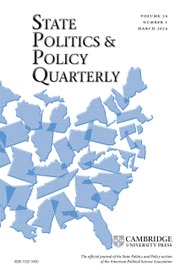Article contents
Relative Unemployment, Political Information, and the Job Approval Ratings of State Governors and Legislatures
Published online by Cambridge University Press: 05 January 2021
Abstract
Research finds that voters benchmark the state's unemployment level to the nation's when holding state policy makers accountable. Yet benchmarking requires some voter knowledge if the standard is to be applied correctly as an accountability rule. This article leverages the fact that voters have more knowledge about their state governors than legislatures assess how much knowledge is necessary for holding these policy makers accountable. Using pooled Cooperative Congressional Election Study data from 2006 to 2016, results find that knowledge has stronger mediating effects for the state legislature than governor. Furthermore, despite the low knowledge levels among voters about the state legislature, collectively there appears to be enough knowledge to hold that policymaking body accountable. The conclusion offers directions for future research.
Keywords
- Type
- Research Article
- Information
- Copyright
- Copyright © The Author(s) 2020
References
- 4
- Cited by




